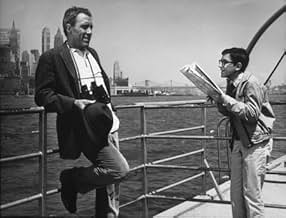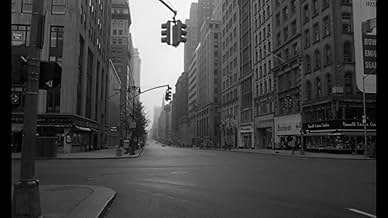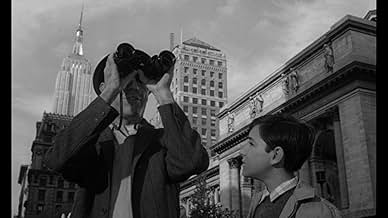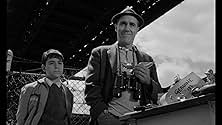Adicionar um enredo no seu idiomaA middle-aged iconoclast, doggedly avoiding the tedium of employment and conventional life, faces the prospect of losing custody of his young ward.A middle-aged iconoclast, doggedly avoiding the tedium of employment and conventional life, faces the prospect of losing custody of his young ward.A middle-aged iconoclast, doggedly avoiding the tedium of employment and conventional life, faces the prospect of losing custody of his young ward.
- Ganhou 1 Oscar
- 4 vitórias e 7 indicações no total
- The Man in the Restaurant
- (as Phil Bruns)
- The Man in the Office
- (as John MacMartin)
- News Reporter
- (não creditado)
- Nick Burns' Double
- (não creditado)
Avaliações em destaque
Those years, I must admit, were not very happy ones for me. Self-indulgence is a dead-end. I needed to be working hard, towards a goal, with a family, for me to feel truly fulfilled. And I think that is the case with most of us.
Murray Burns and his world are totally unrealistic AND unhealthy. Do not try to emulate him. It is a trap and a prison. It's like smoking dope all the time: you lose your drive and you increase your cynicism.
But perhaps I'm being too serious. Murray does have the kid, and he seems to fall in love at the end, so maybe there is hope for him. The movie has some great lines and funny characters. The black and white scenes of NYNY in the 1960's are wonderful, Martin Balsam as Murray's brother is one of our greatest actors, Barbara Harris is great, William Daniels is great, Barry Gordon as Rafael Sabattini, etc., is great.
See it and enjoy it but don't take it to heart like I did.
Alexander Hamilton imitations???
Jason Robards, one of the all-time great actors, portrays an idealistic sort of guy who has taken in his sister's son whom she more or less abandoned. Such an idealist is he, that Robards can't bring himself to take employment at jobs that would require him to compromise his standards or work for people whom he doesn't respect. Unfortunately this puts him in danger of losing custody of his nephew, played by young Barry Gordon. A young social worker (played by Barbara Harris) unexpectedly finds herself falling in love with Robards and being taken with his nephew.
There are some really great surprises in this movie. Robards' ukulele performance of 'Yes Sir That's My Baby' is surprisingly pleasant, and much better than just 'on key'; in the part where Barry Gordon joins in, it's obvious he too had some musical talent as he does a fine job as well. In fact it is apparent that Robards was actually playing his uke and if Gordon wasn't also I couldn't tell it. (Used to be a time when performers could play some sort of musical instrument but I have seen more people blatantly fake playing a guitar or piano than I can stomach.) The views of downtown New York in the 60's will certainly be of interest especially to those who lived there then and can look for old (or new) landmarks in the background on the outdoors scenes.
Barry Gordon has to be one of the best juvenile actors ever. It makes me a little ill to think of the ones in the 80's and 90's who were paid ungodly amounts of money to mug for a camera; I bet Gordon was paid far less for a performance that was as fine as any adult's. There are so many good scenes in which he appears but to me the most powerful one is near the end of the film when he is afraid his uncle will take a lousy job just to appease the child welfare department. You can't miss it if you watch the film. Gordon shines in the whole film, and most brightly in that scene.
I don't know how else to say it; I "liked" Barbara Harris in her role, very much. Maybe the best way I can explain is that while I never saw the Broadway play version of this story, the same character in the play was portrayed by an actress who for some reason I just never liked. If someone was going to come into the relationship with Murray (Jason Robards) and Nick (Barry Gordon), she was ideal. I don't know why but if I don't like an actor or actress, I resent it a little when their character gets involved with other characters I care about.
It's amazing how great a movie can be made even if you don't budget latex rubber aliens oozing goo, or space battles, or massive slow-motion explosions or other disasters. This had to be a very low budget film - there are not many actors, the scenes and sets are rather simple one-room locations, the outdoor scenes were shot on location in NY. But when you have a great script with an interesting story and fine performers playing the roles, well it just shows that money alone does not (and can not) make a great film.
I decided to record 'A Thousand Clowns' and save it based on some of the other comments listed here and I am very glad I did. This movie would make an excellent intelligence / maturity test. "Which do you prefer to watch, 'Sixteen Candles' or 'A Thousand Clowns'?" Seldom anymore do I see a movie for the first time and realize that I had been missing something; this movie gave me that feeling. It has immediately entered my short list of favorite films, it's that good. All I can say is watch it and follow the story and you will see one great movie well worth your time.
When I first saw it I was in college and Murray was my hero; his crisis, to me, was all about selling out. Later, after I had started a family, Murray's story seemed less about selling out than about owning up to his devotion to his nephew. By the time I showed this movie to my teenage children, I had come to see Murray's brother -- the master compromiser -- as the hero. Now my children are grown, and I just watched it again -- and for the first time I saw that the buttoned-up male social worker (Mr. Amundson, played by William Daniels), shows great heart in the second act and is the only character who aims at all times to do what he knows is right. Amundson hasn't become my hero, but I saw him as a good man this time -- and I never as a young viewer imagined that he was anything but laughable. Also on this viewing, I came full circle to see that Murray really IS the hero in this story -- not because he's a charming nonconformist but because he does achieve redemption.
What keeps this movie so important for me is that, even after raising children, I still respect Murray's conflict and so I think his redemption really is heroic -- though no more heroic than any parent's true devotion. (If you don't respect Murray's conflict -- if conformity has never bothered you, or if you think he's just a bum, period -- then you might not enjoy this movie.)
This movie grows up with you, but some things remains constant with every viewing: the film's stunning wit, its passion for authenticity (Murray's speech on the fire escape is a deeply moving plea to wake up and live), and its charmed performances. If you like Jason Robards, you will love him in this film. And Gene Saks, as the TV star Chuckles the Chipmunk, does some of the best comedy work I've seen anywhere. (Notice his timing on the line, "She's done a wonderful job," and the ridiculous walk he came up with for the line, "You told me her name was Minnie Mouse!")
As a bonus, this movie gives you a sidewalk-level, free-wheeling view of Manhattan when it wasn't so overpopulated and Lincoln Center was just being built. It's enough to make you want to quit your job and start collecting eagles.
Você sabia?
- CuriosidadesAccording to William Daniels' memoir, several months after production on the film concluded, he attended a private screening of an initial cut that contained no location filming, no marching band music (as was featured in the play), and Paul Richards in the role of Leo Herman, not Gene Saks who had successfully played it on stage but was originally unavailable for filming (ironically, Richards had taken over the part of Leo from Saks in the original Broadway production). This early cut proved to be such a disappointment to the filmmakers, Herb Gardner decided to relinquish his screenwriting fee in exchange for permission from the producers to rewrite several scenes, hire the now-available Saks as a substitute for Richards, shoot a number of exterior scenes on location, and extensively re-edit the film into its final version.
- Erros de gravaçãoAfter Leo leaves the apartment, two different cardboard cutouts of him are used, with different facial appearances.
- Citações
Murray: I just want him to stay with me until I can be sure he won't turn into Norman Nothing. I want to be sure he'll know when he's chickening out on himself. I want him to get to know exactly the special thing he is or else he won't notice it when it starts to go. I want him to stay awake and know who the phonies are, I want him to know how to holler and put up an argument, I want a little guts to show before I can let him go. I want to be sure he sees all the wild possibilities. I want him to know it's worth all the trouble just to give the world a little goosing when you get the chance. And I want him to know the subtle, sneaky, important reason why he was born a human being and not a chair.
- Cenas durante ou pós-créditosIn opening credits: and introducing Barry Gordon as Nick. In the end credits, Gordon is credited to all the different names his character has tried: Nick Burns, Wilbur Malcome Burns, Theodore Burns, Raphael Sabatini, Dr. Morris Fishbein, Woodrow Burns, Chevrolet Burns, Big Sam Burns and Lefty Burns. In the film, however, he is called Nick, Nicky, and Nicholas.
- ConexõesFeatured in The 68th Annual Academy Awards (1996)
- Trilhas sonorasA Thousand Clowns
(1965)
Written by Judy Holliday and Gerry Mulligan
Sung by Rita Gardner
[Played before the opening titles]
Principais escolhas
- How long is A Thousand Clowns?Fornecido pela Alexa
Detalhes
Bilheteria
- Faturamento bruto nos EUA e Canadá
- US$ 5.232.000
- Tempo de duração1 hora 58 minutos
- Cor
- Proporção
- 1.66 : 1
Contribua para esta página




























